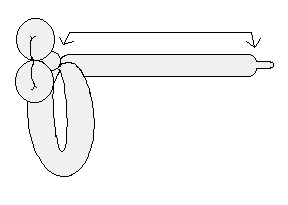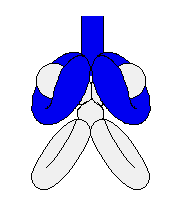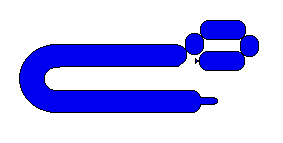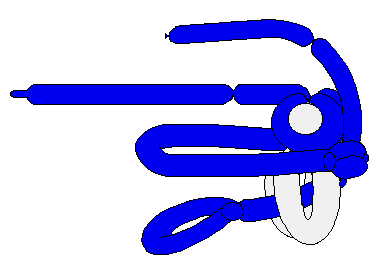Make a Balloon Animal
Visit my gallery page to find instructions
for all balloons previously posted.Tropical Fish
This fish is based on a design described on
Balloon HQ by
Kevin Sanderson of Tasmania. I have made a few modifications and am
pleased to pass on this delightful design.
Instructions

|
The design requires four balloons - three of one color and one of
a lighter color. Inflate all of them leaving about a 3-inch tail.
In the first dark balloon make two eight-inch bubbles and
loop twist them. These will
become eye sockets. |

|
In the light balloon make two four-inch bubbles and loop twist them.
These will become eyes. Follow with a two-inch bubble. Make two
12-16 inch bubbles and loop twist them for pectoral fins. Any
remaining balloon may be popped and tied off. |


|
Push each eye into one of the eye sockets, allowing the rest of the
dark balloon to extend to the back.
In the second dark balloon twist a 3-inch, 1-inch, 3-inch, 1-inch
series. Twist the knot into the last twist to make a loop. Now
pinch twist the two one-inch
bubbles. These will be "cheeks" with the 3-inch bubbles making the
lips. Bring the nipple end around and tie it to the opposite side
of the lips, making a large loop. Squeeze the loop to distribute the
air evenly.
Squeeze the air in the third balloon toward the tail end to distribute
it evenly, and then twist in the middle, making two equal
bubbles. Place this twist through the large loop in dark balloon 2
behind the lips. Twist the ends of the large loop together, locking
balloon 3 in place. |

|
Slip the pectoral fins through the loop in balloon 2, arranging so that
the knot end of balloon 3 is on the top. You should now have an ugly
mess like the one in the picture at the left.
All the long, loose ends need to be twisted together behind the eye
sockets in one big twist in the following manner: |

|
- The top bubble of balloon 3 should be divided in half. After making
the big twist, bring the remaining bubble back over the dorsal (top)
side and tie the knot behind the lips.
- The end of balloon 1 should be below the dorsal balloon. Its long
end will be used to stabilize the tail and complete the ventral (bottom)
side of the fish.
- The large loop will be pulled into the body to hold the pectoral
fins in place. The loop remaining behind the big twist will be one part
of the caudal (tail) fin.
- The bottom bubble of balloon 3 goes between the pectoral fins to form
part of the ventral side. Twist a 1.5-inch bubble at the end of the
balloon, and loop twist the long bubble to make the other half of the
caudal fin.
|
Arrange the two caudal fin halves one above the other. The upper one
should rest between the two bubbles forming the dorsal side, and the
1.5-inch bubble at the end of balloon 3 should be on one side of the
big twist. Using the long end of bubble 1, make a 2-inch pinch twist
on the other side of the tail. Make another bubble the same length as
the ventral bubble and bring it along side of it. Twist the end in
place behind the lips and tuck any leftover balloon inside the body
behind the lips.

(Balloons in the photo are arranged slightly differently for color symmetry)
Gospel Application
This figure has many parts that don't look like much until they all
come together for the final figure. This can be used to illustrate
the fact that events in our lives often don't make sense to us. We
ask "Why is God allowing this to happen?" and can easily get
discouraged or disillusioned. But God has a plan, and everything
that happens in our lives fits into that plan (See Roman 8:28).
Another application from I Corinthians 12 is that the Church is the
body of Christ, and each one of us is a part. No individual is
insignificant in God's sight, and we all need each other to serve Him
most effectively. The fish has been a symbol of Christ since the
first century, and the Church is the body of Christ at work in the
world today.
According to Web Counter
you are visitor number

Yes, the wallpaper is a stereogram!
|






